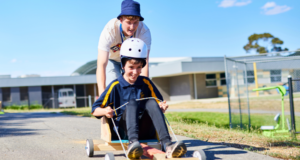What are the benefits of joining a supported playgroup?
Thousands of families head to playgroups around regional Australia every week. For some country parents, it can be one of their few outings each week, where they can connect with other adults and feel less isolated.
For special needs families navigating the confusing world of health and disability, having a safe place where they can meet other parents experiencing the same ups and downs is especially important.
But finding a playgroup that’s equipped to support families of kids with a disability, illness or delay in regional and rural areas can be difficult.
Here’s our practical guide to playgroups and how to find one that suits your needs.
Playgroup enriches your child’s development
From the moment they’re born, children are curious to learn about the world. Their brains develop rapidly, making connections faster between birth and age five than at any other time in their lives. These early years are when the groundwork for learning, health and behaviour is laid down.
Experiences and relationships are critical for your child’s development – it’s how kids learn about their world. Children learn most from their relationships with their parents and siblings. Still, they also discover new things by interacting with other people and watching how you do the same.
Playgroups are a great place to learn these skills because they offer babies, toddlers and young children like yours a wide range of learning activities and experiences in a safe group environment.
Playgroup is a place to connect with other families
Yes, playgroup is an excellent way for your kids to learn, make friends and develop social skills but perhaps more importantly, playgroups are good for parents and families too.
Research, including a 2015 study by the Australian National Health and Medical Research Council Partnership, shows special needs parents, particularly mums, tend to have poorer physical and mental health than parents of typically developing children. There is a range of reasons why:
- Draining day-to-day care requirements
- Struggling to find services for their child and family (especially in country areas)
- Taking on the mental load for the entire family
- Loneliness and isolation
- Job stress and work/life balance
- Financial stress or unemployment
It can be tough to prioritise your wellbeing when you have a family who depends on you. So, many parents put their needs on the backburner. However, mental health is crucial for parents and carers and is integral to your child development.
Playgroups don’t replace professional mental health support. However, they can offer informal supports and reduce some of the everyday stressors for special needs families.
However, playgroup gives parents, like you, the chance to talk about your experiences, ask questions and get support from other parents, grandparents, and carers.
The friendships that develop between families at playgroup often continue long after their children outgrow the group and can be critical life-long relationships.
Is a supported playgroup the best option for my family?
Community playgroups make up most playgroups and cater for a range of children from babies to school age. They are often run by parents voluntarily.
Supported playgroups are designed for parents and carers who need additional support because of their circumstances – perhaps they’re a teen, new to Australia, or going through a difficult time.
Families who have children with a disability, like yours, often benefit from supported playgroups.
What sets supported playgroups apart is they are run by qualified workers such as early childhood educators or disability support workers.
In some playgroups, a worker leads the activities and will introduce you to simple, evidence-based strategies that they can use every day. In other cases, the worker is temporarily there to get things started, work on something, support a guest speaker or run skills development sessions.
The overall supported playgroups aim to do the following:
- Help you build a strong relationship with your child
- Work on your child’s learning and development
- Give your child a safe and creative space to play
- Give you a positive peer support network
- Tap into social and family support networks in your community
- Give you access to information and services
- Empower you with knowledge, skills, and confidence
- Help transition your child to pre-school or school
Parents sometimes stay and join the fun. Other times you’ll be encouraged to let your child play while you take some time for yourself.
Importantly, supported playgroups are an inclusive and non-threatening service for families who benefit from the added wrap-around elements.
The programs are often government-funded and run by community organisations or agencies to keep them affordable. Eligibility criteria can sometimes apply along with a registration process.
Supported playgroups benefit kids, parents, and carer
Kids
- A safe, stimulating environment to learn
- Opportunities to learn speech and language
- Increases confidence in community and social activities
- Play with a variety of toys and equipment
- Learn empathy and embrace difference through play
- Encourages physical activity
- Supports imagination and creativity
- Reduces isolation through social connections and support
- Learn new behaviours through the role modelling
- Get school ready
Parents and families
- Play and interact with their child
- Learn about their child’s disability or diagnosis
- Learn how to care for their child’s needs
- Space to share their experiences and support one another
- Fosters community spirit
- Develop social networks
- A routine that allows families to gather and interact
- Information and connections to support services
Lifely Supported Playgroups
Here at Lifely, we operate supported playgroups in Bendigo and Mildura for families with children aged zero to pre-school who have a disability, developmental delay or are undergoing diagnosis.
Qualified and caring Community Facilitators provide a safe and exciting environment for kids to explore and play with other kids their age.
Local experts in disability, child health and parenting are regular visitors to support you to navigate the confusing world of healthcare and disability, including the National Disability Insurance Scheme (NDIS).




